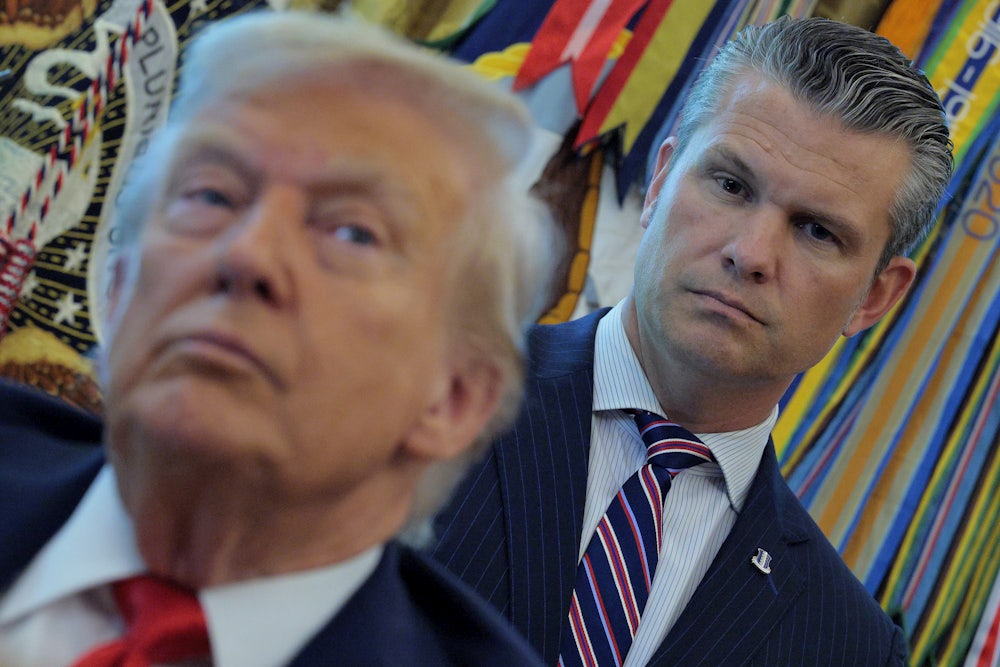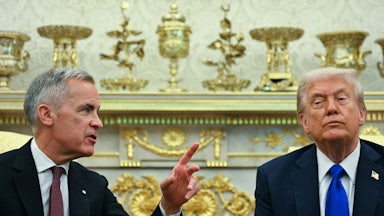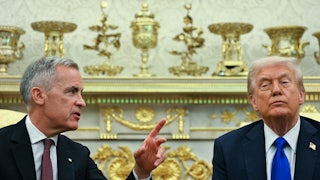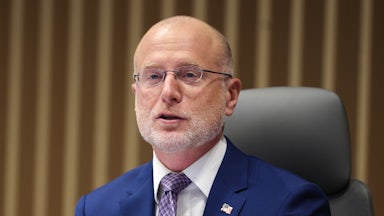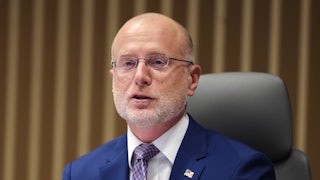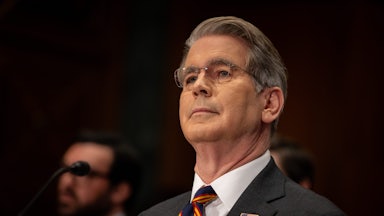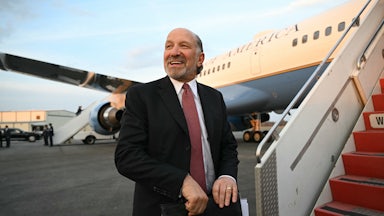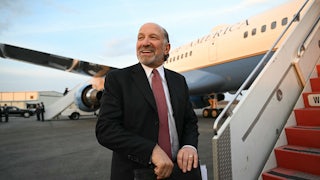With the news that President Donald Trump has taken a sudden interest in renaming the Department of Defense the “Department of War,” one has to wonder: Was the U.S. military really in need of some kind of hypermuscular rebrand? If anything, Trump’s renaming stunt should remind us of a basic fact: The United States is a country that makes war as a matter of course. Out of nearly 250 years of history, it has been at peace for less than 20. The label “defense” was a useful mask for this reality. It allowed liberal internationalists to frame American power as humanitarian, rules-based, and stabilizing, even as Washington propped up dictators and armed death squads and funneled trillions into weapons production.
Euphemism has long been a tool of empire. We don’t torture. We use “enhanced interrogation techniques.” We don’t wage wars of aggression. We “make the world safe for democracy.” We don’t bomb villages. We carry out “precision strikes.” The language dulls the violence, drains it of meaning, and makes it palatable to the public. Defense was the ultimate euphemism that gave America’s wars a moral gloss.
Trump has little use for euphemism. He prefers bluntness, often to the horror of the political class. In 2016, he boasted that the U.S. should have “kept the oil” in Iraq. Weeks into his first administration, he dropped the “Mother of All Bombs” on Afghanistan. Now, by pushing to rename the Department of Defense, he’s stripping away the polite veneer that liberals have relied on for decades. In Trump’s world, war is not something to be ashamed of or disguised. It’s something to flaunt. (It remains astonishing that certain members of the commentariat thought he would be a dovish alternative to the neocons instead of an unrestrained version of the same.)
The renaming doesn’t change the underlying reality. The Pentagon will continue to receive a trillion dollars a year. Contractors will keep extracting profit from the American taxpayer. We will continue sending weapons to Israel and Ukraine. But words matter because they signal intent. Defense was the language of liberal internationalism, of the idea that the U.S. leads through benevolent hegemony. War is the language of naked militarism.
But while Trump is presiding over the stripping away of the last vestiges of liberal internationalism, that order was already in collapse long before Trump returned to the White House. Biden’s choice to back Israel’s war on Gaza, which arguably destroyed the international “rules-based” order by exposing all of its contradictions—as well as America’s lack of commitment to its ostensible principles—demonstrated that the liberal foreign establishment and its Great Works had officially run their course. Trump had little to do with the end of this era.
There’s a reason the bipartisan foreign policy establishment is uneasy about Trump’s move. They prefer that old story and its comforting illusions. In their imaginings, the U.S. is reluctant to use force, burdened with responsibility and forever on the side of freedom. It’s a story that makes hegemony sound like a humanitarian mission. Trump is snitching out the cover story. He’s saying: We make war because that’s what great powers do.
Looking back at the 1947 renaming tells us a lot about the power of words. After World War II, policymakers were deeply concerned about public opinion. Americans were weary of war and skeptical of global entanglements. If the United States was to maintain a massive standing military, it had to be justified as defense against Soviet aggression.
In 1947, Congress passed the National Security Act to reorganize the military after World War II. The old Department of War was transformed, creating the Departments of the Army and Air Force. Along with the Department of the Navy, they were brought under one roof, which was referred to as the National Military Establishment, or NME.*
Two years later, Congress revised the law, turned the establishment into one Cabinet-level executive department, and renamed it the Department of Defense, worried in part that the acronym sounded too much like “enemy.” (Perhaps they were concerned it was too on the nose.) The new name helped launder what was, in practice, a permanent mobilization for global dominance.
Trump is trying to undo that rhetorical move. In some ways, he’s more honest about the nature of American power than his predecessors. He doesn’t want to clothe empire in the language of humanitarianism. He wants to revel in the bloodlust of the warmonger.
For two decades, U.S. officials have insisted that wars in Afghanistan and Iraq were about fighting terrorism and securing democracy. What they delivered was occupation, torture, black sites, drone warfare, and mass death—all while defense contractors made off with billions of taxpayer boodle. All of this grand scam was managed under the banner of “defense.” By calling it “war,” Trump is at least aligning language with reality.
This is not a break with American tradition so much as a return to it. For most of its history, the U.S. government had no qualms about calling its military arm the Department of War. Only in the peculiar climate of the Cold War did “defense” become the preferred label. Trump is collapsing that distinction. He’s reminding us of what the United States has always done and what it intends to keep doing.
The real question is what the public will do with this new honesty. The euphemism of defense lulled generations of Americans into accepting militarism as natural, even benevolent. If Trump’s renaming strips away that comfort, it could finally provoke a reckoning. What does it mean to live in a country whose central institution is openly devoted to war? What does it say about our democracy that over half of our discretionary budget goes to war even as social needs go unmet? What does it mean for the world that the most powerful nation declares itself not a guardian but a warrior? The Washington establishment wants to keep the old name precisely because it papers over these questions.
Renaming the Department of Defense the Department of War won’t make American militarism any worse. It’s already as bad as it can get—endless wars, unchecked defense budgets, and contractors extracting billions in profit—and both parties are to blame. What it does is remove the mask. It forces us to look directly at what the U.S. does with its power. We are not defending. We are waging war.
That’s a hard truth to swallow, but it’s the truth, nonetheless. The Cold War liberal internationalists believed the right words could conceal empire in benevolent branding. Trump is tearing off the euphemistic label. In his crude way, he’s done something remarkable. He’s made empire call itself by its real name.
* This article has been updated to more accurately describe the 1947 changes.
